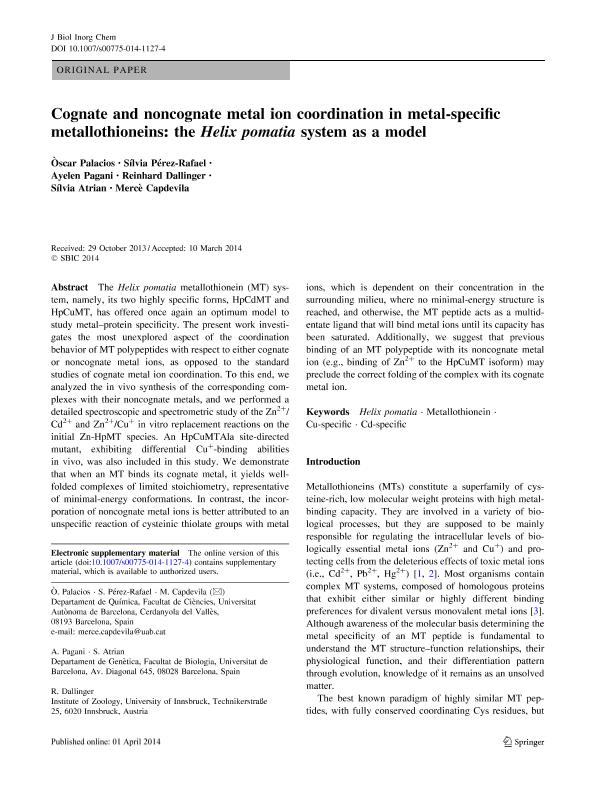Artículo
Cognate and noncognate metal ion coordination in metal-specific metallothioneins: The Helix pomatia system as a model
Palacios, Oscar; Perez Rafael, Silvia; Pagani, María Ayelén ; Dallinger, Reinhard; Atrian, Silvia; Capdevila, Merce
; Dallinger, Reinhard; Atrian, Silvia; Capdevila, Merce
 ; Dallinger, Reinhard; Atrian, Silvia; Capdevila, Merce
; Dallinger, Reinhard; Atrian, Silvia; Capdevila, Merce
Fecha de publicación:
04/2014
Editorial:
Springer
Revista:
Journal of Biological Inorganic Chemistry
ISSN:
0949-8257
e-ISSN:
1432-1327
Idioma:
Inglés
Tipo de recurso:
Artículo publicado
Clasificación temática:
Resumen
The Helix pomatia metallothionein (MT) system, namely, its two highly specific forms, HpCdMT and HpCuMT, has offered once again an optimum model to study metal?protein specificity. The present work investigates the most unexplored aspect of the coordination behavior of MT polypeptides with respect to either cognate or noncognate metal ions, as opposed to the standard studies of cognate metal ion coordination. To this end, we analyzed the in vivo synthesis of the corresponding complexes with their noncognate metals, and we performed a detailed spectroscopic and spectrometric study of the Zn2+/Cd2+ and Zn2+/Cu+ in vitro replacement reactions on the initial Zn-HpMT species. An HpCuMTAla site-directed mutant, exhibiting differential Cu+-binding abilities in vivo, was also included in this study. We demonstrate that when an MT binds its cognate metal, it yields well-folded complexes of limited stoichiometry, representative of minimal-energy conformations. In contrast, the incorporation of noncognate metal ions is better attributed to an unspecific reaction of cysteinic thiolate groups with metal ions, which is dependent on their concentration in the surrounding milieu, where no minimal-energy structure is reached, and otherwise, the MT peptide acts as a multidentate ligand that will bind metal ions until its capacity has been saturated. Additionally, we suggest that previous binding of an MT polypeptide with its noncognate metal ion (e.g., binding of Zn2+ to the HpCuMT isoform) may preclude the correct folding of the complex with its cognate metal ion.
Palabras clave:
HELIX POMATIA
,
METALLOTHIONEIN
,
CU-SPECIFIC
,
CD-SPECIFIC
Archivos asociados
Licencia
Identificadores
Colecciones
Articulos(CEFOBI)
Articulos de CENTRO DE EST.FOTOSINTETICOS Y BIOQUIMICOS (I)
Articulos de CENTRO DE EST.FOTOSINTETICOS Y BIOQUIMICOS (I)
Citación
Palacios, Oscar; Perez Rafael, Silvia; Pagani, María Ayelén; Dallinger, Reinhard; Atrian, Silvia; et al.; Cognate and noncognate metal ion coordination in metal-specific metallothioneins: The Helix pomatia system as a model; Springer; Journal of Biological Inorganic Chemistry; 19; 6; 4-2014; 923-935
Compartir
Altmétricas



